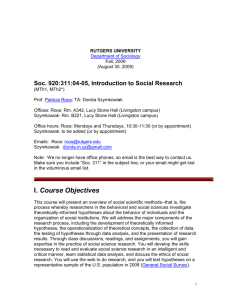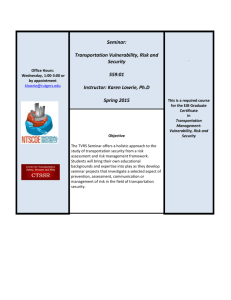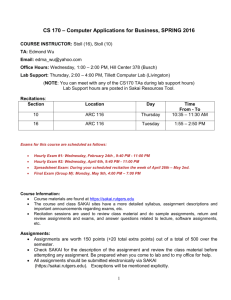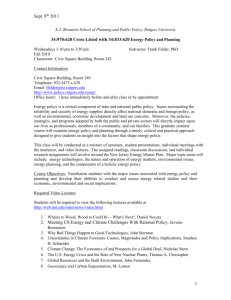Fall 2012
advertisement
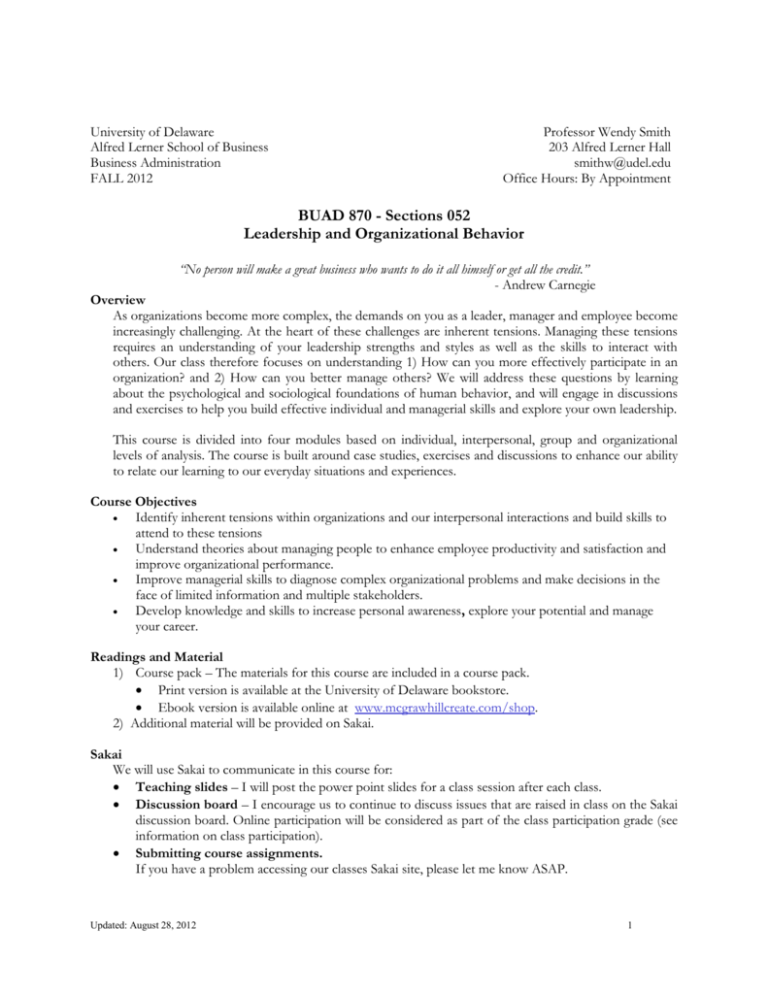
University of Delaware Alfred Lerner School of Business Business Administration FALL 2012 Professor Wendy Smith 203 Alfred Lerner Hall smithw@udel.edu Office Hours: By Appointment BUAD 870 - Sections 052 Leadership and Organizational Behavior “No person will make a great business who wants to do it all himself or get all the credit.” - Andrew Carnegie Overview As organizations become more complex, the demands on you as a leader, manager and employee become increasingly challenging. At the heart of these challenges are inherent tensions. Managing these tensions requires an understanding of your leadership strengths and styles as well as the skills to interact with others. Our class therefore focuses on understanding 1) How can you more effectively participate in an organization? and 2) How can you better manage others? We will address these questions by learning about the psychological and sociological foundations of human behavior, and will engage in discussions and exercises to help you build effective individual and managerial skills and explore your own leadership. This course is divided into four modules based on individual, interpersonal, group and organizational levels of analysis. The course is built around case studies, exercises and discussions to enhance our ability to relate our learning to our everyday situations and experiences. Course Objectives Identify inherent tensions within organizations and our interpersonal interactions and build skills to attend to these tensions Understand theories about managing people to enhance employee productivity and satisfaction and improve organizational performance. Improve managerial skills to diagnose complex organizational problems and make decisions in the face of limited information and multiple stakeholders. Develop knowledge and skills to increase personal awareness, explore your potential and manage your career. Readings and Material 1) Course pack – The materials for this course are included in a course pack. Print version is available at the University of Delaware bookstore. Ebook version is available online at www.mcgrawhillcreate.com/shop. 2) Additional material will be provided on Sakai. Sakai We will use Sakai to communicate in this course for: Teaching slides – I will post the power point slides for a class session after each class. Discussion board – I encourage us to continue to discuss issues that are raised in class on the Sakai discussion board. Online participation will be considered as part of the class participation grade (see information on class participation). Submitting course assignments. If you have a problem accessing our classes Sakai site, please let me know ASAP. Updated: August 28, 2012 1 Grading - Personal Performance Evaluation My intention is to create an atmosphere that enables you to expand your understanding of how to manage yourself and others, and develop your skills in critical thinking, writing, leadership, etc. In order to provide an assessment that supports this learning, I am allowing you to create your own performance evaluation metrics that will enable you to draw from your own strengths, and take risks with the material. Below is a range of allocations for each of the assignments. You can submit your allocations on Sakai before September 14. More information about this grading process will be handed out in class and can be found on line. If you do not submit your own grade allocation by September 14th your grades will be allocated using the default allotment listed below. Grade Range 10% 15% 15% - 50% 15% - 50% 15% - 50% Default Allotment 10% 15% 25% 25% 25% Assignment/Exercise Case Analysis #1 Reflected Best Self Case Analysis #2 Class Participation Final Project Detailed information about the goals, expectations, and grading for each of these assignments can be found online, and will be handed out and discussed in class. Questions and reactions I look forward to hearing your questions and reactions to the material and to the course. The best way to contact me is through email smithw@udel.edu. Course Values Engagement and Participation – Your learning and your classmates’ in this class depends on your engagement with the materials and participation in class discussions. To help us all keep focused on the class discussion please keep all cell phones and computers OFF during class time. Please see me if there are circumstances that require you to keep your cell phone or computer on. Communal respect – This course is mostly discussion-oriented, and is most effective when we can build a community of scholars helping one another learn and explore the material. Our collective learning depends on our ability to respect one another's opinions in our comments in class, and respect that some of our class discussion should not be shared more broadly outside of class. Academic honesty – Academic honesty is expected in this course. Please be aware that plagiarism is a serious violation in this course, and throughout your academic career. More information about academic honesty at the University of Delaware can be found at http://www.udel.edu/stuguide/0607/code.html#honesty. Updated: August 28, 2012 2 Professor Wendy Smith BUAD 870 Fall 2012 Detailed Course Outline Note: Please follow the appropriate dates for your section. All materials can be found in the coursepack, unless otherwise noted. INTRODUCTION August 29 - Organizations as complex systems. Readings Kreitner, R. & Kinicki, A. 2004. Developing People-Centered Organizations and Skills. In R. Kreitner & A. Kinicki (Eds.), Organizational Behavior, Vol. Sixth Edition: 2-33. New York, NY: McGraw-Hill Companies, Inc. Chapter 1. Questions to consider in advance of the class What is organizational behavior and why is it important to study? What is an effective organization? Who is an effective manager? What are your goals for this course? INDIVIDUAL LEVEL September 5 – Personality Readings Gladwell, M. 2004. Personality Plus: Employers Love Personality Tests, But What Do they Really Reveal? New Yorker. This article can be found on Sakai in “Additional Readings”. Questions to consider in advance of the class What did you learn from the personality test? Was anything surprising about the results? What do personality tests tell us in general? What do they mask? What do they reveal? When might personality information be helpful in a business? What might be some limitations? Assignments due in class In advance of this class, please fill out a personality assessment online for the Meyers Briggs Type Indicator. This test is confidential and anonymous, and no identifying information is kept about you personally. One such test can be found at http://www.humanmetrics.com/ (see Jung Typology Test). Even if you already know your MBTI, please fill this out again. Please print out your results from the web browser and bring them to class. We will not share the results with one another, but will talk about the results and the nature of the test in class. September 12 – Motivation Readings Hausser Food Products. A link to buy this case online will be provided on Sakai. Herzberg, F. 1968. One More Time: How do you motivate employees? Harvard Business Review Assignments due in class Personal performance evaluation due by Friday. Please fill this out on Sakai. Please email me the names/emails of your final project group members by the end of the week. September 19 - Ethical Decision Making Readings Martha McCaskey. HBS Case Study, 9-403-114. Badaracco, J. L. 1998. The Discipline of Building Character. Harvard Business Review. 76(2): 114-124. Updated: DRAFT: August 28, 2012 3 Professor Wendy Smith BUAD 870 Fall 2012 Questions to consider in advance of the class As Martha McCaskey, what is your plan of action for finishing the Silicon 6 project? What is troubling Martha McCaskey? Do you agree with her assessment of the situation? Was the situation avoidable? How did McCaskey end up in this situation? How would Badaracco advise McCaskey to behave in this situation? Have you ever experienced an ethical decision between right and right? What did you do? Assignments due in class Martha McCaskey Case – Please submit one copy Sakai and share copies with your group. September 26 – NO CLASS; Final project work week Assignment: Please email your feedback to your group members in advance of this class, and submit a copy of the feedback YOU WROTE on Sakai. Please submit your Martha McCaskey Reflection Paper on Sakai. October 3 – What the FUN! Guest Speaker Nat Measley/ Reflected Best Self Readings Drucker, Managing Oneself Assignment: Reflected Best Self INTERPERSONAL LEVEL October 10 – Person-Situation Fit/Difficult Conversations Readings A Day in the Life of Alex Sanders Casciaro, T. & Lobo, M. S. 2005. Competent Jerks, Lovable Fools and the Formation of Social Networks. Harvard Business Review. Hackley, S. 2005. How to say what matters most. Harvard Business Review (N0508C). Assignments: Please fill out the “Communication Prework” found on Sakai. Please email me a proposal for your final project by the end of the week. October 17 – Managing Up – Power and Influence Readings Jaime Turner at MLI, Inc. Gabarro, J. & Kotter, J. 2000. Managing Your Boss. Harvard Business Review. October 24 - Negotiations Readings Material will be handed out in class. GROUPS/TEAMS October 31 – Team Work Readings C&S Wholesale Grocers: Self Managed Teams. HBS Case Study, 9-404-025. Updated: DRAFT: August 28, 2012 4 Professor Wendy Smith BUAD 870 Fall 2012 Hackman and Coutu, Why Teams Don’t Work. Questions to consider in advance of the class What are the assumptions behind Rick Cohen’s decision to transition to a team concept of employment? What are the costs and benefits of making this organizational work process change? How would you implement the decision to move to teams? ORGANIZATIONAL/SYSTEM LEVEL November 7 – Organizational Learning and Inovation Readings IDEO Product Development Argyris (1977) Double Loop Learning Questions to consider in advance of the class 1. How would you characterize IDEO's process, organization, culture, and management? 2. Should IDEO accept the Visor project as is (on a dramatically reduced schedule)? Should they try to persuade Handspring's management to change its aggressive launch schedule? Or should they simply decline the project? November 14– Managing complex organizations and competing strategic demands Readings Digital Divide Data: A Social Enterprise in Action Harvard Business School Cases, 307106. Smith, W. K., Binns, A., & Tushman, M. 2010. Complex business models: Managing strategic paradox simultaneously. Long Range Planning, 43(2): 448-461. Available on Sakai under “Resources/Additional Readings” Questions to consider in advance of the class DDD’s goals are to achieve both a financial and social mission. How effective are they in their financial mission? In their social mission? What should DDD do going forward? Should they continue to strive for both a financial and social mission? If so, how? If not, what should they do? What should Hockenstein do? How can organizations best manage social and financial goals? November 21 – Thanksgiving – ENJOY! November 28 - Group Project Presentations/Wrap Up Questions to consider in advance of the class In this session we will evaluate this course together. Be prepared to answer: What top three (or more) ideas did you learn from this class? How do you think you might implement these ideas in your life/job? Assignment Final Project paper and presentations. Please email me a copy of your presentation by 4 pm so that it will be ready for the evening. Please bring a paper copy of your group paper to class. Please submit your individual analysis on line. Updated: DRAFT: August 28, 2012 5 Professor Wendy Smith BUAD 870 Fall 2012 Class Schedule and Assignments: Overview - FALL 2012 Class 1 2 3 4 5 6 7 8 9 10 11 12 13 Thursday Topics Cases 29-Aug Intro INDIVIDUAL 5-Sep Personality and Individual Differences 12-Sep Motivation Hauser 19-Sep Ethical Decision Making Martha McCaskey 26-Sep FINAL PROJECT WORK WEEK 3-Oct What the Fun? Guest Speaker Nat Measley/ Reflected Best Self INTERPERSONAL 10-Oct Person-Situation Fit 17-Oct Managing Your Boss 24-Oct Negotiations TEAMS 31-Oct Teams ORGANIZATION 7-Nov Organizational Learning and Innovation 14-Nov Organizational Approach 21-Nov Thanksgiving - ENJOY 28-Nov Final Projects Updated: August 28, 2012 Reading Kreitner & Kinicki (Chapter 1) Gladwell (2004) Herzberg (1968) Badaracco (1998) Drucker (1999) Alex Sanders Jamie Turner Casciaro and Lobo (2005); Hackley (2005) Gabarro and Kotter (2000) C&S Grocer Hackman and Coutu IDEO Digital Divide Data Argyris (1977) Smith, Tushman, Binns (2010) Assignments Due MBTI Personal Performance Eval due by Friday McCaskey Case Due Case 1 Feedback and Reflection Reflected Best Self Due Final Project Proposal Due Final Project Due 6


